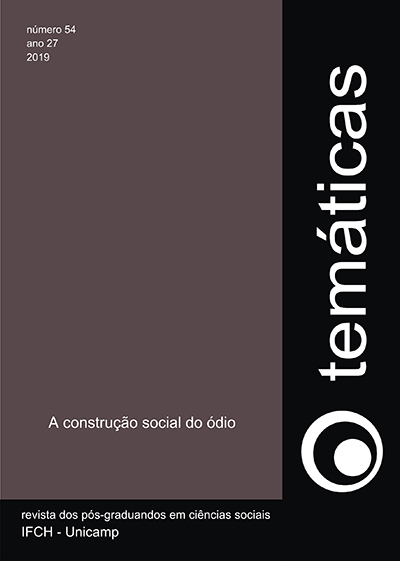Abstract
The social construction of monsters (COHEN, 2000) and bandits (MISSE, 2010), as an antithesis to what is human, well, crosses the constitution of States. Fanon (1968) already told us about the Manichean and totalitarian character of the colonial world, where the colonized was established as maleficent, dehumanized. Re-elaborating these readings, Mbembe (2017) sees how the construction of dehumanization brings separation and creates a lack of shame in stigmatizing and addressing only the possibility of being seen as a human being to our own. It is the production of a class of undesirables that will make it possible to redirect a portion of society to the place of the banality of violence and death, limited to blacks - and, also, to other groups considered inferior. There is also a grudge in contemporary societies (CHOMSKY, 2017) when the rivalry between workers in neoliberalism makes its effects on everyday life felt through increasing competition. Significant structural changes in the world of work are perceived by Harvey (1993), who points out how these flexible job arrangements create a great deal of job dissatisfaction, generating competition among workers, who begin to depreciate their competitors, emerging - due to sharp competition - racism , sexism, machismo, xenophobia (Harvey, 2018), feelings are co-opted by politicians like Donald Trump in the USA, Le Penn in France, Lega Nord in Italy and Jair Bolsonaro in Brazil, through promises of restitution of order and progress.
References
ALEXANDER, Michelle. A nova segregação: racismo e encarceramento em massa. São Paulo: Boitempo, 2018.
BUTLER, Judith. Precarious life: The Powers of Mourning and violence. London: Verso, 2004.
COHEN, Jeffrey Jerome. A Cultura dos Monstros: Sete Teses. in SILVA, Tomaz Tadeu da (Org.). Pedagogia dos Monstros. Belo Horizonte: Autêntica, 2000.
CHOMSKY, Noam. Sistema neoliberal coloca trabalhadores uns contra os outros, diz Noam Chomsky. Operamundi. 4. Julho 2017. Disponível em: https://operamundi.uol.com.br/politica-e-economia/47491/sistema-neoliberal-coloca-trabalhadores-uns-contra-os-outros-diz-noam-chomsky. Acesso em: 20 out. 2018.
FANON, Frantz. Os Condenados da Terra. Rio de Janeiro: Editora Civilização Brasileira, 1968.
GRAHAM, Stephen. Cidades sitiadas: o novo urbanismo militar. São Paulo: Boitempo, 2016.
HARVEY, David. A condição pós-moderna. Uma pesquisa sobre as origens da mudança cultural. São Paulo: Edições Loyola, 1993.
HARVEY, David. A loucura da razão econômica: Marx e o capital no século XXI. São Paulo: Boitempo, 2018.
MBEMBE, Achille. Necropolítica. São Paulo: n-1 edições, 2018.
MBEMBE, Achille. Políticas da Inimizade. Ed. Antígona. São Paulo. 2017.
MISSE, Michel. Crime, sujeito e sujeição criminal: aspectos de uma contribuição analítica sobre a categoria” bandido”. Lua Nova, n. 79, 2010.
WACQUANT, Loic. As prisões da miséria. Rio de Janeiro: Zahar, 2011.

This work is licensed under a Creative Commons Attribution-NonCommercial-ShareAlike 4.0 International License.
Copyright (c) 2019 Camila de Lima Vedovello, Fabiane Cristina Albuquerque, Thayná Jesuina França Yaredy

